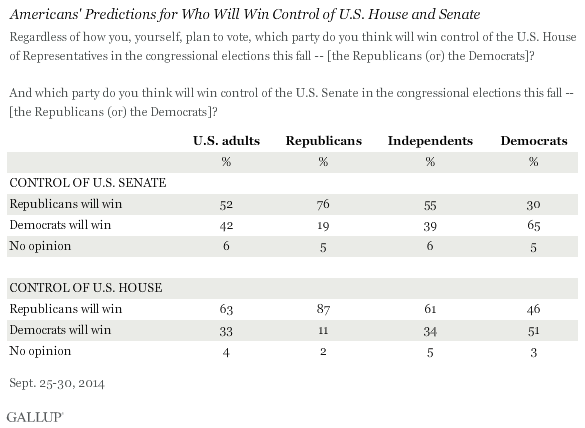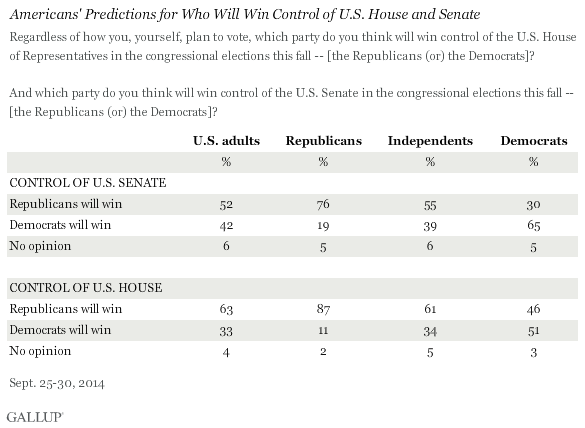By Glynn Wilson –
Fifty-two percent of Americans say they expect the Republican Party to win control of the U.S. Senate in November, according to the latest Gallup poll on the subject, although there are a few key races still up in the air that could change that.
An even larger majority of Americans, 63 percent, say Republicans will retain their majority in the House of Representatives, a not so surprising number considering the electoral advantage already enjoyed in the lower chamber by the GOP.
“Partisans on both sides show signs of wishful thinking when assessing which party will win control of the U.S. House and Senate this fall,” Gallup says.
Nearly two-thirds of Democrats interviewed in the Sept. 25-30 survey say their own party will win the Senate — not an unreasonable conjecture given that Democrats currently control the upper chamber and would need to lose a net of six seats to lose the majority.
But the slight majority of Democrats, 51 percent, also believe their party will win in the House — an outcome out of step with the reality most pundits are expecting based on the electoral math.
Despite the closeness of several key races that Republicans must win if they are to gain control of the Senate, the vast majority of Republicans, 76 percent, are optimistic the Republicans will take back control of the U.S. Senate.
A full 87 percent of Republicans believe the party will maintain control of the House, a view reflected by the numbers and their awareness that the party already has a firm hold on the lower chamber.
The more objective predictions may be those made by political independents, which mirror the national averages, according to Gallup. More than half of independents predict Republicans will win the Senate, and a solid majority — 61 percent — say Republicans will keep the House.
This is the first time Gallup has asked Americans about the likely party outcome in the U.S. Senate, and thus it has uncertain value as a forecasting tool, the company says.
“However, as Gallup has noted in the past, Americans’ predictions for the U.S. House, albeit limited in number, have been remarkably accurate, aligning with the winning party in all five midterms in which the question was asked,” Gallup says. “This includes the 2010 and 2006 midterms — particularly notable since party control changed after both elections — as well as in three earlier midterms: 1962, 1958 and 1946.
Gallup has also found that Americans as whole have a good track record of predicting which presidential candidate will win the popular vote, forecasting the correct winner in each of the four elections since 1996.
The midterm prediction trend spans relatively few elections, and only two recent ones, Gallup says. “However, the results reinforce research that suggests prediction markets (including polls asking the public to predict election outcomes) can be more accurate than other forecasting tools, such as expert predictions, heavily engineered models and voter-preference polls.”
Although Americans are fairly strong in their view that the Republicans will retain control of the House, the new poll finds registered voters are more closely divided in their actual intentions to vote for the Republican versus the Democratic candidate in their congressional district.
Forty-seven percent of registered voters say they would vote for the Republican in their district if the election were held today, while 46 percent would vote for the Democrat.
This is similar to what Gallup found in August, although the numbers are now slightly more favorable to the Republicans than in April when the Democrats were ahead by five percentage points, 49 percent to 44 percent.
“Political parity on the generic ballot among registered voters is typically a positive sign for Republicans in midterm years,” Gallup concludes. “That is because Republican voters tend to turn out in greater numbers than Democratic voters do in these lower-turnout elections.”
Republicans’ actual turnout advantage in 2014 will be highly dependent on the degree to which Democrats can inspire their base closer to the election, Gallup says. “Right now, rank-and-file Republicans are showing about average engagement in the election relative to the past four midterms, while Democrats’ attention is somewhat below average.”
Gallup’s Bottom Line
Gallup’s new question asking Americans who they think will win control of the Senate offers some hope for Republicans, as they lead on this by 10 points, 52 percent to 42 percent, Gallup concludes. “But with no trends available for comparison, and control of the Senate likely coming down to a handful of races that are too close to call — such as in Arkansas, Alaska, Colorado, Louisiana, North Carolina, Kansas, Georgia and Iowa — it is not clear how useful this national perceptual measure really is.”
The Republicans’ 33-seat advantage in the House is small by historical standards, and Gallup analysis suggests that Americans’ low satisfaction with the direction of the country could fuel higher seat turnover than usual. “But the conformity of the new poll findings with other important signals — including President Barack Obama’s subpar approval rating, Obama’s net-negative effect on voters’ choice of candidates, and Republicans’ current advantage on several indicators of potential turnout — adds weight to their significance.”
Survey Methods
Results for this Gallup poll are based on telephone interviews conducted Sept. 25-30, 2014, with a random sample of 1,252 adults, aged 18 and older, living in all 50 U.S. states and the District of Columbia. For results based on the total sample of national adults, the margin of sampling error is plus or minus 4 percentage points at the 95 percent confidence level.















